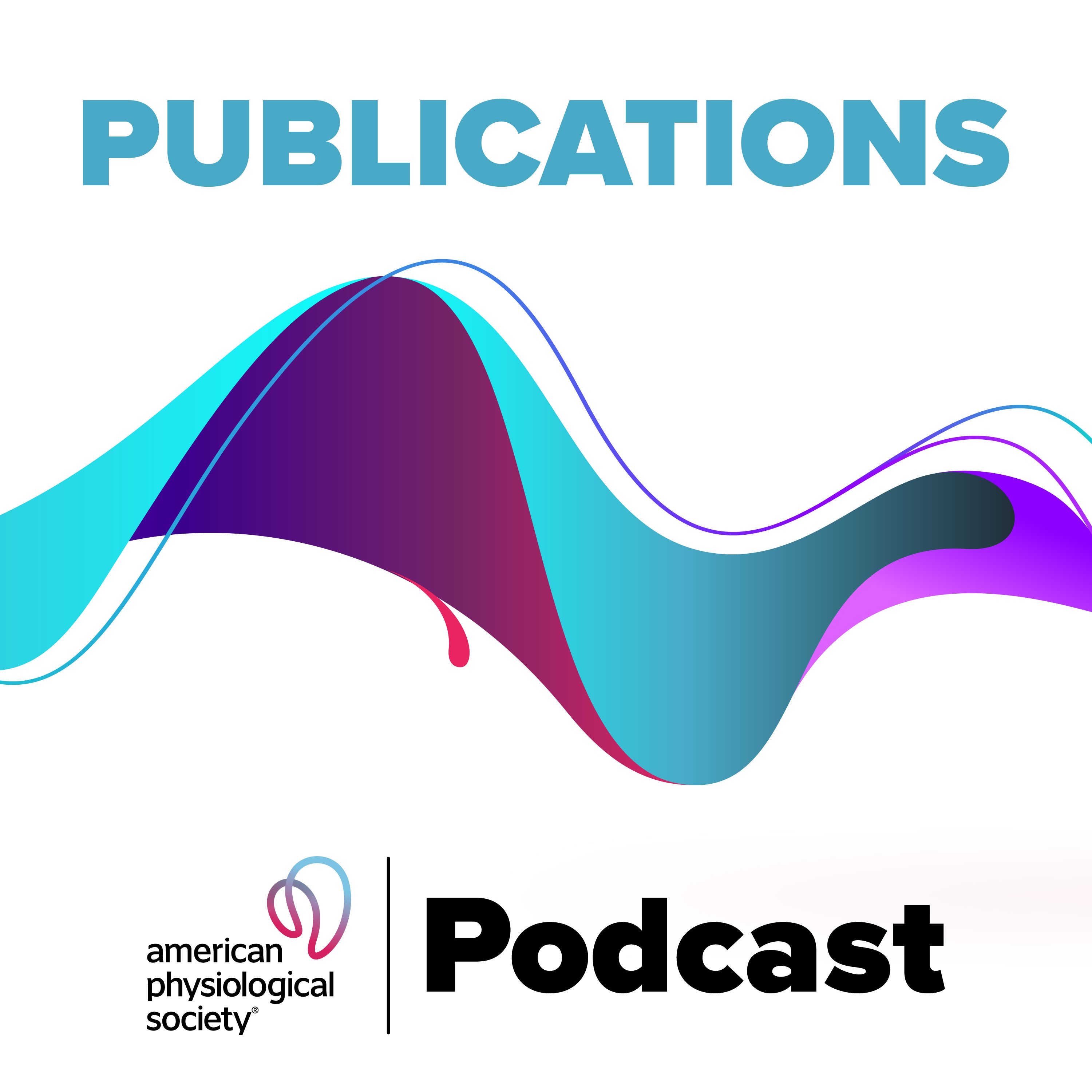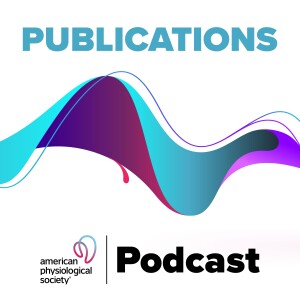
5.1K
Downloads
100
Episodes
Listen to author interviews, commentaries from thought leaders, and insightful discussions about important topics in physiology and scientific publishing. Brought to you by the American Physiological Society (APS) Publications.
Listen to author interviews, commentaries from thought leaders, and insightful discussions about important topics in physiology and scientific publishing. Brought to you by the American Physiological Society (APS) Publications.
Episodes

Wednesday Nov 20, 2024
The Diamond Framework for Team-based Active Learning for Physiology Courses
Wednesday Nov 20, 2024
Wednesday Nov 20, 2024
In this episode, coauthors Daniela G. L. Terson de Paleville and Staci W. Saner explore their paper on incorporating Team-Based Learning (TBL) into physiology and biomedical sciences education. While TBL has become a popular method for teaching conceptual and procedural subjects, it remains underutilized in these fields. Daniela and Staci provide a step-by-step guide for integrating TBL into physiology courses and introduce their innovative Diamond Framework for TBL. Inspired by Bloom’s taxonomy, this visual taxonomy places "application" at the core, offering a new way to structure learning. Tune in to discover how TBL can transform physiology education and enhance student engagement and learning outcomes.
Advances in Physiology Education 2024 48:4, 857-866

Wednesday Nov 20, 2024
Wednesday Nov 20, 2024
In this episode, coauthors Eann Malabanan, Owen P. McGuinness, and Kendra H. Oliver dive into their recently published paper, "Leveraging Digital Assets: Lessons from a 14-Year-Old Isotope Tracer Course for Professional Scientists." They explore how the COVID-19 pandemic reshaped scientific training programs, forcing many to pivot to virtual formats due to social distancing and travel restrictions. With a focus on the Isotope Tracers in Metabolic Research course—a long-running training program for scientists—they discuss how the integration of digital assets not only helped maintain engagement during the pandemic but also enhanced post-pandemic in-person training. By reviewing survey data from both virtual and in-person formats, they reveal the surprising value of digital elements in fostering better understanding and engagement, even in well-established programs. Tune in to learn how digital strategies can support diverse learning needs and improve professional development for scientists across the globe.
Advances in Physiology Education 2024 48:3, 661-669

Friday Nov 01, 2024
Students' approaches to developing scientific communication skills
Friday Nov 01, 2024
Friday Nov 01, 2024
Join coauthors E.S. Louise Faber, Kay Colthorpe, Louise Ainscough, and Judit Kibedi in this APS Publications podcast as they delve into their recent paper, "Students’ Approaches to Developing Scientific Communication Skills." In this episode, they explore the strategies and resources that undergraduate science students employ to enhance their science communication abilities. Discover how different approaches can influence academic performance in written assessments and the critical role of explicit guidance and engagement with teaching staff in fostering these essential skills. Tune in for a deep dive into the intersection of education, communication, and scientific literacy, and learn how these findings can inform future teaching practices.
Advances in Physiology Education 2024 48:3, 639-647

Friday Sep 20, 2024
Friday Sep 20, 2024
In this episode of the APS Publications podcast, coauthor Ole J. Kemi dives into the recently published article "Graduate prospects explain undergraduate program standing in university league sports science tables." The discussion highlights how university rankings play a crucial role for applicants and stakeholders in evaluating undergraduate programs.
Kemi explains that these rankings assess various criteria affecting student life and future prospects, but the study reveals that graduate prospects—the professional benefits students gain post-graduation—are the most significant factor influencing ranking outcomes. This insight emphasizes the importance of career outcomes in shaping perceptions of program quality and helps guide prospective students in their decision-making process. Tune in to learn more about the implications of these findings for universities and students alike!
Advances in Physiology Education 2024 48:2, 330-337

Thursday Sep 12, 2024
Thursday Sep 12, 2024
In this episode of The APS Publications podcast, coauthor Emmanuel Bourdon highlights the illuminations article titled "Enhancing the understanding of abstract neurophysiology concepts by first-year students at the University of La Réunion." First-year physiology students can find the subject challenging, struggling to understand abstract concepts without any context. To address this, the authors introduced a pedagogical intervention for first-year medical and health physiology students that aimed to link abstract concepts and a pathological disorder, together with a discussion of a specific therapeutic intervention. This pedagogical intervention was well received by first-year physiology students who better understood how basic nerve physiology concepts can be applied within the clinical setting.
Advances in Physiology Education 2024 48:3, 655-660

Friday Sep 06, 2024
MitomiRs in hibernating thirteen-lined ground squirrels
Friday Sep 06, 2024
Friday Sep 06, 2024
In the latest APS Publications Podcast, coauthors Karyn Robichaud, and Brynne Duffy discuss their fascinating research on the altered mitochondrial microRNA profiles in thirteen-lined ground squirrels during hibernation. This study sheds light on the metabolic changes these squirrels undergo during torpor and IBE, revealing 38 liver mitomiRs that differ based on hibernation state.
Physiological Genomics 2024 56:8, 555-566

Monday Aug 26, 2024
Group work enhances belonging in an online course
Monday Aug 26, 2024
Monday Aug 26, 2024
In this episode of The APS Publications podcast, coauthors Shea E. Carr, Thad E. Wilson, and Jennifer L. Osterhage highlight their education research titled "Assigned group work is associated with increased student motivation and perceptions of belonging in an asynchronous online physiology laboratory course." This study explores the effect of assigned group work in an asynchronous online physiology laboratory course on student motivation and belonging. Students’ perceptions of belonging and competence-related beliefs were higher, and effort and psychological costs were lower, when assigned to groups compared to students not assigned to groups. Students assigned to groups noted peer interactions as the most inclusive aspect of the course, whereas instructor interactions were noted as inclusive by those not assigned group work.
Advances in Physiology Education 2024 48:3, 593-602

Wednesday Aug 14, 2024
Channel Catfish Transcriptomic Response to Hypoxia
Wednesday Aug 14, 2024
Wednesday Aug 14, 2024
In this episode of The APS Publications Podcast, Brian D. Ott highlights the recently published paper titled "Hypothalamic transcriptome response to simulated diel earthen pond hypoxia cycles in channel catfish (Ictalurus punctatus)." Channel catfish are an economically important species that experience diel episodic periods of hypoxia that can reduce appetite. This is the first study to investigate their transcriptome from the hypothalamus in a simulated 24-h span in a commercial catfish pond, with 12 h of hypoxia and 12 h of normoxia. The research revealed functional groups of genes relating to hypoxia, angiogenesis, and glycolysis as well as individual target genes possibly involved in appetite regulation.
Physiological Genomics 2024 56:8, 519-530
